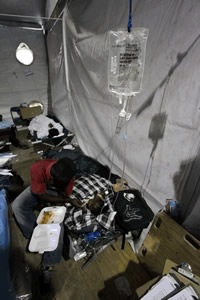
Baxter's product donations, grants and employee financial giving and volunteerism help address critical local and global needs. In 2009, combined contributions from Baxter and The Baxter International Foundation, the philanthropic arm of Baxter, totaled more than $52 million, and employees recorded 159,000 hours volunteering within their communities. These funds and employees' time are used in a variety of ways to support organizations that are the most relevant and will have the highest impact on the community.
Financial Giving
Monetary contributions from Baxter and The Baxter International Foundation are most often focused on increasing access to healthcare and helping developing nations and local communities in crisis. Last year, for example, Baxter's businesses and facilities donated $30.4 million to address critical needs in more than 50 countries. Baxter Malaysia, for instance, helped the indigenous community of Orang Asli recover from flooding and landslides by providing the group with funding to purchase gardening tools, clothing and other necessities to start a community crop farming program. In the United Kingdom, the company supported healthcare organizations Against Breast Cancer and Children with Leukemia through cash donations and employee participation in benefit races.
The Baxter International Foundation awarded $3.6 million in donations last year, including nearly $1.2 million in grants to organizations outside of the U.S. and $755,000 to 826 organizations through the Foundation's Dollars for Doers and Matching Gifts programs that support employees' philanthropic efforts. Foundation grants are typically made to fulfill needs in communities where Baxter employees live and work, and seek to increase access to dental care, mental health, and other healthcare services for children, the uninsured, veterans, and the elderly.
One grant awarded in 2009 helps increase basic healthcare services and psychological care to homeless and abandoned children in Cuernavaca, Mexico. The organization, Casa Hogar Amor, was founded in 2003 and operates three houses where an average of 100 children and teenagers reside. When they arrive, many of these children suffer from malnutrition, skin diseases and developmental delays as a result of their previous, often unsanitary, living conditions, and many have also experienced abuse and neglect. At Casa Hogar, they receive food, shelter, medical assistance and counseling services as well as the support they need to develop a positive sense of well-being.
The foundation also approved a grant in 2009 to award $240,000 over two years to the Chronic Care Foundation (CCF) in support of a national program on the prevention of non-communicable chronic diseases in India. Chronic diseases account for 53 percent of all deaths and 44 percent of disabilities in India. Through this program, CCF plans to launch an awareness and educational campaign about these disorders in 15 states in the country, including several in which Baxter facilities are located. The campaign will include the distribution of a resource kit on chronic diseases and a series of awareness camps and activities in cities, towns and rural areas. A full listing of The Baxter International Foundation grants awarded in 2009 is available at www.baxter.com/grants.
Product Donations
In 2009, Baxter also provided $18.6 million in donations of Baxter products to 76 countries in need. This included 6,000 bags of ciprofloxacin (1,000 courses) to treat leptospirosis, a bacterial infection caused by contaminated water, donated in the aftermath of the floods caused by Typhoon Ketsana in the Philippines.
More recently, Baxter and The Baxter International Foundation committed more than $2.5 million to support disaster relief efforts in response to the January 2010 devastating earthquake in Haiti. Baxter has worked to meet the significant demands for product by collaborating closely with humanitarian aid organizations such as AmeriCares and Direct Relief International. Joint efforts with these organizations and others have yielded shipments of over 280,000 units valued at over $2.2 million. For example, Baxter worked with Direct Relief International to facilitate timely, targeted product donation support. Valued at more than $1.7 million, the 11-ton donation included a variety of antibiotics, IV solutions and other vital medical products.
"These supplies were desperately needed for the doctors and other medical professionals treating patients injured during the quake," said Direct Relief's Emergency Response Director Brett Williams, who is managing Direct Relief's response in Haiti. "They helped replenish resources, which were rapidly dwindling."
Additionally, The Baxter International Foundation approved $350,000 in grants to organizations such as The American Red Cross, CARE and Project Hope, to support both immediate and longer-term needs in Haiti, with a focus on health-related efforts. The Foundation also activated its Employee Disaster Relief Matching Gift Program, matching $150,000 in employee contributions.
Employee Volunteerism
In 2009, more than 6,500 Baxter employees spent 159,000 hours volunteering in their communities, such as working at a hospital or food pantry, participating in community park clean-up days, or teaching at a local school.
In October of last year, for instance, 2,400 Baxter employees across the Asia Pacific region took part in "Make a Meaningful Difference Month," participating in service projects supporting those who are underserved or have special needs. As part of the company's commitment to education and healthcare, 25 volunteers from Baxter India partnered with Search Years, a non-governmental organization dedicated to helping children and adolescents realize their full potential. Led by Dr. Ashok Moharana, the Director for Medical Affairs in the region, the employees provided free check-ups and lectures on maintaining basic hygiene and sanitation, and distributed hygiene and medical kits for common childhood ailments. In Taiwan, 100 volunteers collected books to help rebuild the Ping Duan Junior High School library, which had been destroyed by Typhoon Morakot in August of 2009.

